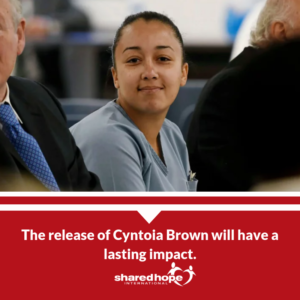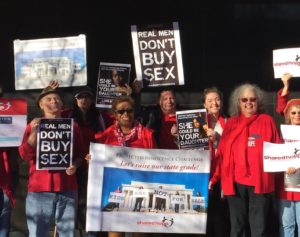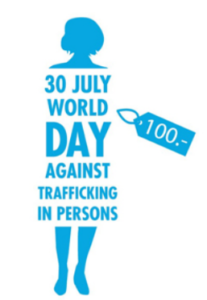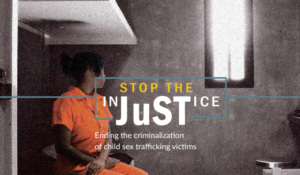
Sometimes the most important news is the most difficult to hear. On the same day that Shared Hope International celebrated the release of our 9th annual Protected Innocence Challenge report cards, we heard that the Kansas Prisoner Review Board had decided not to recommend Hope Zeferjohn, a child sex trafficking victim, for a pardon. After working all year to advocate for victim-centered, trauma-informed legislation, produce in-depth analysis reports, and support our partners in translating their strong laws into practice, this was indeed difficult news to hear. But it was also important to hear because it challenges us and reminds us of the challenge we face as a nation: how do we keep our focus on the purpose of passing human trafficking laws?
That purpose is, and always should be, to protect those who have been victimized and prevent others from being exploited. Most would agree that purpose seems clear and uncontroversial. However, as this relatively new area of law has developed and the knowledge gap about human trafficking persists in broader society, the implementation of laws developed for this important purpose has become increasingly complex and sometimes disconnected from the very purpose behind passing those laws.
Where this has become painfully relevant is in the context of sex trafficking victims charged with crimes as a result of their trafficking victimization. Trafficking victims charged as co-conspirators alongside their traffickers, or in lieu of their traffickers, is a phenomenon appearing in headlines, leaving many of us shaking our heads. We know this is not moving the fight forward, yet we also recognize the complexity of this intersecting victimization and criminal conduct. Simultaneously, we are also facing the fact that this is not an outlier case. Based on Shared Hope’s ongoing research into this issue, these cases are even more common than the headlines would indicate.
Evidenced by Hope Zeferjohn’s case, minors are not exempt from facing serious criminal consequences as a result of their trafficking victimization – far from it. Not only can minors face potential prostitution charges in 20 states, but the headlines also show that child sex trafficking victims are being picked up and charged as co-conspirators alongside their traffickers (e.g., see this and this), or are facing other serious charges that directly resulted from their victimization (e.g., see this, this, this, this, this, this and this). And yet, these cases are proceeding through the criminal justice system despite language enshrined in the Trafficking Victims Protection Act, the groundbreaking law that established the federal crime of sex trafficking, indicating that trafficking victims should be protected and not punished as a result of their victimization. According to the “Purposes and Findings” enshrined in Section 102(a)(24) of the Trafficking Victims Protection Act of 2000:
“Trafficking in persons is a transnational crime with national implications. To deter international trafficking and bring its perpetrators to justice, nations including the United States must recognize that trafficking is a serious offense. This is done by prescribing appropriate punishment, giving priority to the prosecution of trafficking offenses, and protecting rather than punishing the victims of such offenses.”
The Protected Innocence Challenge, which has focused on analyzing child sex trafficking laws in all 50 states and DC every year since 2011, seeks to advance that protective purpose of anti-trafficking laws at the state level. However, Shared Hope’s grades do not analyze the implementation and enforcement of those laws, including whether the laws are being implemented in a victim-centered and trauma-informed manner. For example, Kansas’ ‘A’ grade reflects the strength of the laws enacted to address child sex trafficking and respond to victims, including whether the law allows for child sex trafficking victims to be criminalized. For the last three years, Kansas has earned an “A” for having passed legislation that comprehensively addresses the crime with one glaring exception: Kansas state law fails to protect survivors of child sex trafficking from facing criminal consequences as a result of their own victimization. For the last nine years, Shared Hope has relentlessly called on legislators to develop statutory tools for recognizing and appropriately responding to sex trafficking victimization all in the hopes of ensuring that exploited children, like Hope Zeferjohn, are protected, not punished.
Recognizing that policy must be shaped by the realities of implementation and enforcement, hearing from those in the field who are on the front lines of fighting this crime is essential. To that end, Shared Hope’s policy work involves engaging with survivors, law enforcement, service providers, and policymakers. For several years now, Shared Hope has been convening the JuST Response Council, a group of individuals from around the country with expertise on issues related to juvenile sex trafficking. This group is geographically varied and they bring to the table a diverse range of professional and lived experience perspectives, including that of service providers, survivor leaders, government agencies, law enforcement, prosecutors, clinicians, policy experts, attorneys and others. Currently this group is working on field guidance for criminal justice stakeholders to help shift away from the type of retributive, victim-blaming, and not trauma-informed response that we see occurring in Hope Zeferjohn’s case. This field guidance has been the central project of the Council for over 3 years and we are excited to release the report in January 2020.
In addition to convening the Council to work through difficult policy issues, we have also been convening and consulting with stakeholders in the field for the past several months, including conducting a national survey/poll this summer, to understand how the Protected Innocence Challenge laws are being implemented. The field input we’ve gathered, along with a growing collection of unjust cases and a persistently low national score on victim protections, indicate there is a need to revise the Framework to deepen our focus on victim protections.
Therefore, perhaps it is the tragedy of Hope Zeferjohn’s case that answers our initial question. Human trafficking laws are designed to protect survivors; to keep our focus on that purpose, it is clear that we, as stakeholders, must make that the core purpose and goal of our work.



 By Marissa Gunther, Director of Growth Strategies, Shared Hope International
By Marissa Gunther, Director of Growth Strategies, Shared Hope International
 He quickly realizes that he can’t save all of the children alone. He needs more help.
He quickly realizes that he can’t save all of the children alone. He needs more help.
 And so, we support the United Nation’s
And so, we support the United Nation’s 
 Astonishingly,
Astonishingly, 






